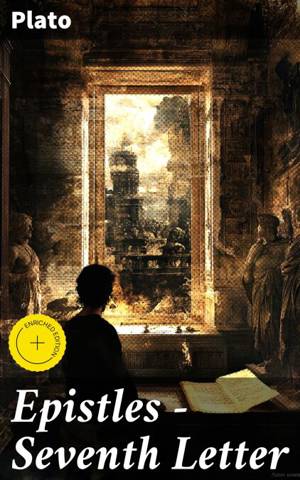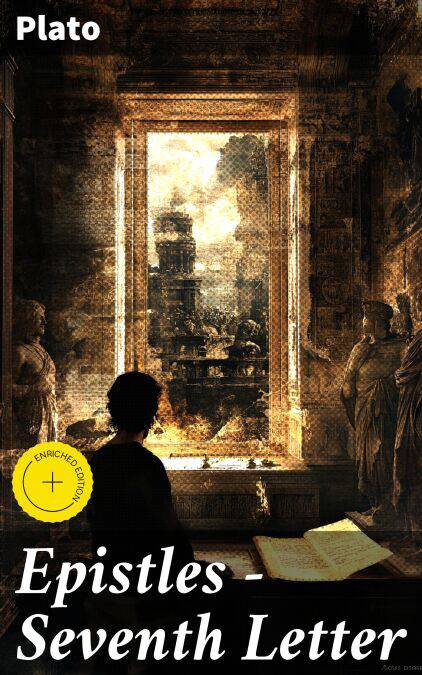
Bedankt voor het vertrouwen het afgelopen jaar! Om jou te bedanken bieden we GRATIS verzending (in België) aan op alles gedurende de hele maand januari.
- Afhalen na 1 uur in een winkel met voorraad
- In januari gratis thuislevering in België
- Ruim aanbod met 7 miljoen producten
Bedankt voor het vertrouwen het afgelopen jaar! Om jou te bedanken bieden we GRATIS verzending (in België) aan op alles gedurende de hele maand januari.
- Afhalen na 1 uur in een winkel met voorraad
- In januari gratis thuislevering in België
- Ruim aanbod met 7 miljoen producten
Zoeken
Epistles - Seventh Letter E-BOOK
Enriched edition. Exploring Truth, Leadership, and Reality in Ancient Greece
Plato
E-book | Engels
€ 1,99
+ 1 punten
Omschrijving
Plato's "Epistles - Seventh Letter" stands as a profound testament to his philosophical inquiries and political theories. This poignant letter, written in a time of political turmoil in Sicily, addresses the nature of truth, the role of the philosopher in society, and the complexities of governing with wisdom. Written in an epistolary style, the letter juxtaposes personal reflection with philosophical discourse, revealing Plato's insights on the responsibility of philosophers to engage in the political sphere, and the inherent risks of such involvement. The literary texture, characterized by reflective prose and rich metaphor, invites readers to contemplate the moral dilemmas intertwined with power and knowledge. Plato, a towering figure of Western philosophy, utilized his experiences and observations of Athenian politics and Socratic dialogues to craft this letter. His relationships with various rulers and his own exile influenced his understanding of philosophical governance and the often perilous role of the philosopher in leadership. Through the Seventh Letter, Plato articulates his disillusionment with political life, emphasizing the significance of philosophical ideals over transient power. This work is highly recommended for anyone seeking to unravel the intricate relationship between ethics and politics in philosophical thought. "Epistles - Seventh Letter" not only enriches the reader's understanding of Plato's philosophical legacy but also provides timeless reflections relevant to contemporary political theory, making it an essential read for scholars and enthusiasts alike.
In this enriched edition, we have carefully created added value for your reading experience:
- A succinct Introduction situates the work's timeless appeal and themes.
- The Synopsis outlines the central plot, highlighting key developments without spoiling critical twists.
- A detailed Historical Context immerses you in the era's events and influences that shaped the writing.
- An Author Biography reveals milestones in the author's life, illuminating the personal insights behind the text.
- A thorough Analysis dissects symbols, motifs, and character arcs to unearth underlying meanings.
- Reflection questions prompt you to engage personally with the work's messages, connecting them to modern life.
- Hand‐picked Memorable Quotes shine a spotlight on moments of literary brilliance.
- Interactive footnotes clarify unusual references, historical allusions, and archaic phrases for an effortless, more informed read.
In this enriched edition, we have carefully created added value for your reading experience:
- A succinct Introduction situates the work's timeless appeal and themes.
- The Synopsis outlines the central plot, highlighting key developments without spoiling critical twists.
- A detailed Historical Context immerses you in the era's events and influences that shaped the writing.
- An Author Biography reveals milestones in the author's life, illuminating the personal insights behind the text.
- A thorough Analysis dissects symbols, motifs, and character arcs to unearth underlying meanings.
- Reflection questions prompt you to engage personally with the work's messages, connecting them to modern life.
- Hand‐picked Memorable Quotes shine a spotlight on moments of literary brilliance.
- Interactive footnotes clarify unusual references, historical allusions, and archaic phrases for an effortless, more informed read.
Specificaties
Betrokkenen
- Auteur(s):
- Vertaler(s):
- Uitgeverij:
Inhoud
- Aantal bladzijden:
- 32
- Taal:
- Engels
Eigenschappen
- Productcode (EAN):
- 4064066466992
- Verschijningsdatum:
- 9/04/2021
- Uitvoering:
- E-book
- Beveiligd met:
- Digital watermarking
- Formaat:
- ePub

Alleen bij Standaard Boekhandel
+ 1 punten op je klantenkaart van Standaard Boekhandel
Beoordelingen
We publiceren alleen reviews die voldoen aan de voorwaarden voor reviews. Bekijk onze voorwaarden voor reviews.









